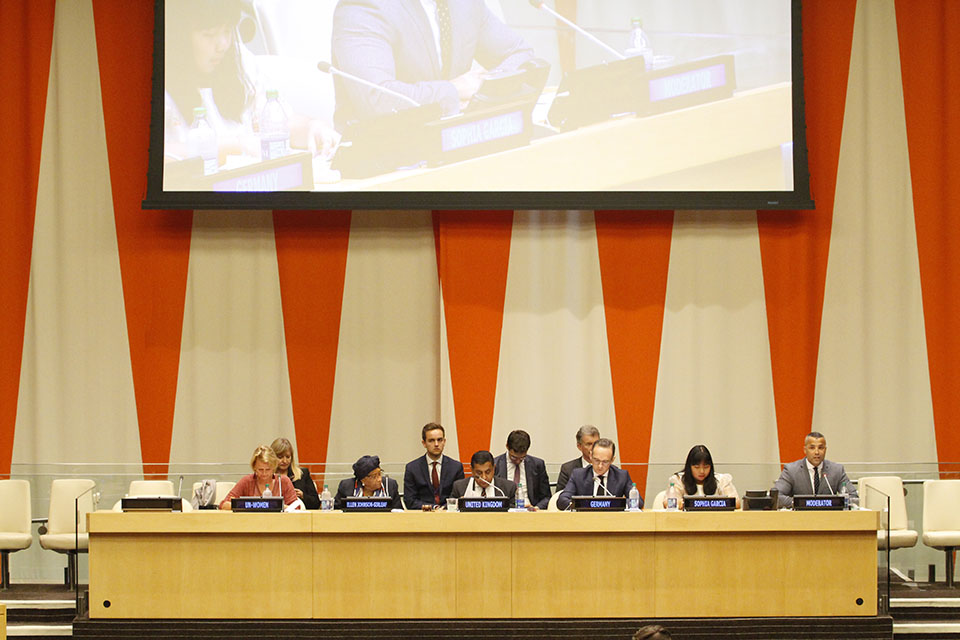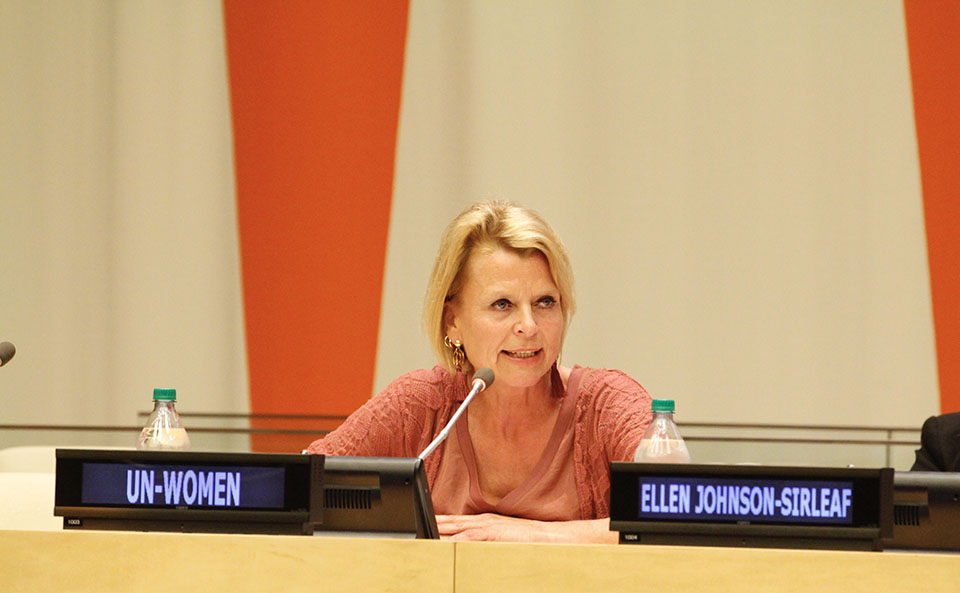UN Security Council event calls for renewed commitments to advance the women, peace and security agenda
Date:

Almost two decades following the adoption of United Nations Security Council resolution 1325, significant progress has been made in advancing the women, peace and security agenda. However, implementation of the agenda has been slow, and much more needs to be done to stop the systematic exclusion of women from peace negotiations and decision-making, said Asa Regnér, UN Women Deputy Executive Director, at the opening of a high-level side event of the Security Council on 23 April in New York.
Leading up to the 20th anniversary of Security Council resolution 1325, Germany and the United Kingdom, in collaboration with UN Women, hosted the event, bringing together Member States, United Nations entities, regional organizations and civil society to who pledged new commitments and actions to advance the Women, Peace and Security agenda. The event took place at the sidelines of the high-level Open Debate of the Security Council on Women, Peace and Security, chaired by Minister for Foreign Affairs of Germany Heiko Maas,, which saw the adoption of UN Security Council resolution 2467, calling for specific, time-bound commitments to combat conflict-related sexual violence.
In his remarks, Minister Heiko Maas pointed out on the need for institutionalization of the commitments around gender equality, and advocacy around the promotion of women in peace and security spaces. “We are 180 years late in achieving gender quality,” he said. “Women continue to be excluded and sexual violence is still a reality. It is important to focus on the implementation of the resolution today.”
His co-chair, Lord Tariq Ahmad, the Prime Minister’s Special Representative on Preventing Sexual Violence in Conflict of the United Kingdom, noted the importance of working together on the agenda: “Today we come together and reinforce resolution 1325 that started 20 years ago. In the world there are many capable women and we should raise voices for them. Looking at the example of Sri Lanka, we need to highlight inspirational women with the will to bring peace. We should collaboratively stand up.”
“We shouldn’t have to be talking in 2019 about the need for gender equality because it should have been achieved already.” - @tariqahmadbt, Special Representative on Preventing Sexual Violence in Conflict of the UK @UKUN_NewYork #UNSCR1325 #WomenPeaceSecurity #WPSin2020 pic.twitter.com/nxa4TkK4MF
— UN Women (@UN_Women) April 23, 2019
“The challenge to each of you in this room is to do what you should, to do what is right and to make the world an equal place.” - Ellen Johnson Sirleaf, Former President of Liberia. #UNSCR1325 #WomenPeaceSecurity #WPSin2020 pic.twitter.com/Y8qurSIZv9
— UN Women (@UN_Women) April 23, 2019
Adopted in 2000, resolution 1325, recognizes that women have a central role to play in achieving and sustaining peace and security, specifically in conflict-prevention and resolution efforts, peace-keeping, relief and recovery. The resolution, reinforced and complemented by other subsequent resolutions, officially confirmed women’s right to participate in all aspects of peace and security. It calls for women to be better protected from human rights violations, including conflict-related sexual violence, and have access to justice and services to eliminate discrimination.
“Peace is not the absence of war, but also access to justice and guarantee of well-being.” - Sophia Dianne C. Garcia from @gpafp2018 #UNSCR1325 #WomenPeaceSecurity #WPSin2020 pic.twitter.com/U8qmJmbNN0
— UN Women (@UN_Women) April 23, 2019
Speaking at the event, former Liberian President, who is also the first female Head of State in Africa and one the pioneers of the Women Peace and Security agenda, Ellen Johnson-Sirleaf noted that 2020 is an emblematic anniversary to celebrate the progress and achievements on advancing the women, peace and security agenda. “Women in leadership positions in governance and in peace and security should became a routine not an exceptional event,” she stressed. “We can only achieve this with the political will of change, and change will come. The challenge now, is to do what we promise to do and to do it right, in order to make the world an equal place”.
“We continue to face challenges, lack of channels and platforms and lack of capacities; despite the progress, the goals are not reached. Youth participation advances and advocates for gender equality, breaking down the barriers that exist for the inclusivity in peace processes,” said Youth, Peace and Security Representative, Sophia Dianne C. Garcia, who was only six years old when the resolution was adopted.
She urged the international community to advocate with Member States, civil society and UN to work together to provide platforms that allow meaningful participation of youth and women in decision-making processes at all levels, adding that, “young women are tired of being identified as victims, we want to be part of processes.”
A total of 75 pledges were made during the event, ranging from Member States pledging to develop National Action Plans and policies; increasing financial contributions to promote women’s meaningful participation in peace processes, including in peacekeeping; and commitments to reinforce the vital role that civil society play in building peace and equality in communities and working with survivors of conflict-related sexual violence.

UN Women Deputy Executive Asa Regnér shared UN Women’s commitments, which include: strengthening engagement and protection of women’s human rights defenders; promoting women’s economic security; working to increase the number of women in uniformed services in peacekeeping and in national security institutions; increasing women’s participation in peace tables; improving gender-responsive conflict analysis and planning; and expanding financing of the women, peace and security agenda.